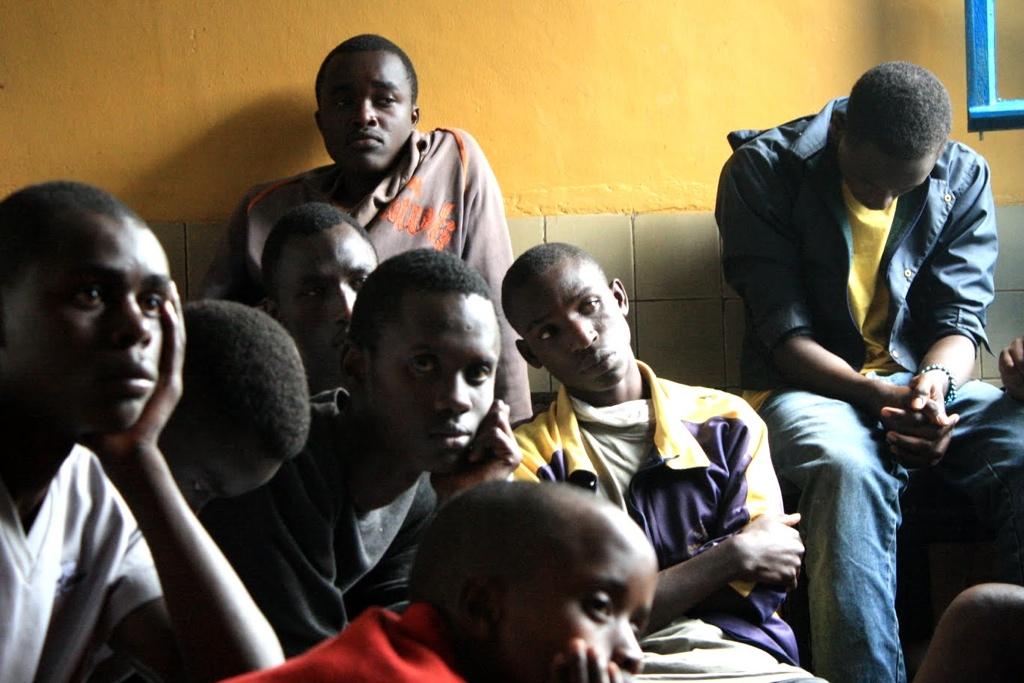What will happen to Rwanda’s orphans?
Orphans listen as officials explain the Noel Nyundo will relocate them to families in nearby communities.
NYUNDO, Rwanda — When given the chance to raise objections, teenage orphans at the Noel Nyundo Orphanage stood up one by one, detailing the reasons they should not be sent away.
Officials listened carefully at the meeting, taking notes. The teens said they would be treated like servants in adoptive homes, and that their real families don’t want them. Some fear they will be attacked if they tried to reclaim their family land. Others fear they will have to drop out of school.
Rwandan officials, however, said the teens’ fears are baseless and that the children will all be carefully placed with safe families.
Seventeen years after civil war and genocide killed millions and left hundreds of thousands of parentless children, they said, Rwanda is ready to begin the process of becoming orphanage-free.
Rwanda: Blood on Kagame's hands?
The Noel, Rwanda’s largest and oldest orphanage is the first to be downsized, with plans to integrate some 450 children over three years old into families, leaving just 150 babies at the center. And while officials say the process will be gradual and safe, the children themselves say they will not find homes among strangers, or in the families that abandoned them.
International donors say doing away with orphanages is impractical in this impoverished country and downsizing will only discourage donations. Orphanage staff say with so many children of unknown origins, they don't know how they can relocate them all.
“We don’t even know our families,” one teenage girl told officials and other orphans. “How can we know they will take care of us?”
Other teens said they have visited relatives and warned they will face trouble if they try to attempt to reclaim the land where their families once lived. Rwanda is Africa’s most densely populated country and almost all the people survive on subsistence farming. Competition is fierce for land, and orphans say it can be dangerous.
A blind boy stood in the meeting, and said he lost his sight when he was attacked after making a claim on his family property. A girl said she was threatened just for asking about the land.
“I went to my family,” a boy in a green-striped shirt with sunglasses tucked into the collar told the officials and other orphans. “At first, they liked me. Then they started threatening me because I asked about my land.”
Officials answered the teens concerns individually, saying families would be taught to care for them, and those that could not afford their new charges would be given money to help pay for food, clothes and school. Land disputes, they said, would be settled by local authorities.
Rwanda: Chimps vs. humans
At the Ministry of Gender and Family Promotion a few days later, Benilde Uwababyeyi, a child protection specialist, said the downsizing of the orphanage is part of a larger plan to place every orphan in the country in a family, and to one day close all the orphanages.
“Rwandan policy stipulates that each child should live in a home,” said Uwababyeyi, “That is why we are proceeding this way. We will do in such a way that no child or institution will be frustrated.”
But some international donors say the process already frustrates them.
Charles Trace, the chairman of the United Kingdom-based Point Foundation, said his organization has funded a library, a computer room, dormitories, new bathrooms, medical facilities and dining halls in the past few years. All of these projects benefit the older students at the Noel orphanage. Some donors, he said, are already considering taking their efforts — and their dollars — outside of Rwanda.
Statistics about orphans in Rwanda vary wildly. Some say there are thousands, others say as many as 1 million. Trace also said closing orphanages is impractical, regardless of government intentions.
“Rwanda still remains an exceptionally poor country,” he said. “And while there is significant wealth in Kigali and the government is doing a lot for the cause, there are still going to be mothers dying in child-birth, and babies being left and not being looked after.”
For the teenage residents of the Noel, however, their departure from the orphanage appears imminent. When Rwandan officials announced plans to downsize, the teens looked pensive and worried. A boy stood and suggested they remain at the center until they finish school, and his fellow orphans laughed and applauded. Another boy said he grew up at the center, and he doesn’t want to leave his home.
“We grew up all together,” he said. “We are little brothers, and big brothers. We should stay together.”
The story you just read is accessible and free to all because thousands of listeners and readers contribute to our nonprofit newsroom. We go deep to bring you the human-centered international reporting that you know you can trust. To do this work and to do it well, we rely on the support of our listeners. If you appreciated our coverage this year, if there was a story that made you pause or a song that moved you, would you consider making a gift to sustain our work through 2024 and beyond?
